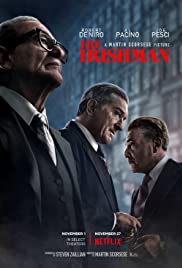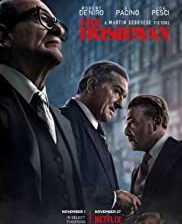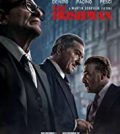- Two Thanksgiving Thoughts for the ACAPosted 11 years ago
- Shop til you Drop at the Healthcare Marketplace Part 2: Frustration!Posted 11 years ago
- An Early Casualty in the Affordable Care FightPosted 11 years ago
- Some Good News for a ChangePosted 11 years ago
“The Irishman” directed by Martin Scorsese

Screenplay by Steve Zaillian (from Charles Brandt’s book)
Main Cast: Robert DeNiro, Al Pacino, Joe Pesci, Harvey Keitel, Ray Romano, Bobby Cannavalle, Ana Paquin, Stephen Graham
Running Time: 209 Minutes

Like a lot of people, I looked forward to one of 2019’s most anticipated releases, Martin Scorsese’s “The Irishman.” I didn’t need to see it during its limited November 1 theatrical release and was OK waiting for it to premiere on Netflix on November 27.
Because of all the press the movie received over the last few years, I was motivated to watch (or re-watch) as many Scorsese feature films as I could before seeing “The Irishman.” The only one I haven’t seen is his 1997 “Kundun.” In the same way I didn’t write a review because I had no idea what to say about 2017 Best Picture Oscar-winning “Moonlight”, I have been unable to write about “The Irishman”, but for a different reason. “Moonlight” is overwhelming in its uniqueness and my emotional response to it, where “The Irishman” — which I split into five viewings — is derivative and uninspiring. It wasn’t just the three-and-a-half hour running time that prevented me from seeing it in one sitting; I found the story itself uninspired and unengaging, despite its big-name leads and high production quality. Scorsese references his own and other movies throughout, which I found distracting and self-congratulating. In the opening shot alone, he borrows from the “Goodfellas”‘ legendary tracking shot into and through the nightclub (this time into a nursing home), doo-wop music and narration by the lead character. Like “Goodfellas”, and in the same way, the camera guides us into a frozen meat truck. You hear scoring music of Jerry Vale’s “Pretend You Don’t See Her”, which Vale lip-syncs in his appearance in “Goodfellas.” Vale also appeared in Scorsese’s 1995 “Casino”, which itself was too derivative of “Goodfellas” for me to fully appreciate, although I’ll still watch it every few years because it’s so well-made, especially Robert Richardson’s energetic and showy camera work. Another borrowed “Goodfellas” scene comes up when Robert DeNiro (as title character Frank Sheehan) kicks a guy while the guy’s on the ground, just like when Jimmy Conway (DeNiro) kicks Billy Batts (Frank Vincent) after Batts repeatedly insults Tommy DeVito (Pesci) at the bar. I’ve heard “The Irishman” described as “Scorsese’s Greatest Hits”, which is a fair label. Again, he also borrows from other directors’ movies. A character says someone “has been dying from the same heart attack for ___ years”, which Michael Corleone says about Hyman Roth in Francis Ford Coppola’s 1974 “The Godfather Part II.” In the context of how serious and intense that movie is, it’s a funny and memorable line. At a point in “The Irishman”, the narrator references “A fairy named Ferry.” Joe Pesci (who portrays Russell Bufalino here) appears as a gay character named David Ferry in Oliver Stone’s 1991 “JFK.” That list of film references in “The Irishman” is far from all-inclusive but I have stop somewhere. I originally thought about keeping a pen and pad with me so I could note every reference during my second viewing but that would have been tedious to both write and read. The quality of the movie making itself is solid — as evidenced by its ten Oscar nominations — it’s just that so much of what we see we’ve seen before in Scorsese (and other) movies and, again, the story is not a great one.
In the long buildup to the release of the movie, a lot was made about the anti-aging technology used on several of the actors and it’s another element I find distracting. The camera is on the actors’ — specifically DeNiro and Pesci — faces too long and too close so we really are forced to focus on and be impressed by them. George Lucas once said about the effects in the original “Star Wars” — and I’m loosely paraphrasing — “The visual effects serve the shot, not the other way around.” They overdo the aging effects and makeup, especially on Pesci. When I saw Pesci as part of a stage discussion with the other lead actors, I was relieved he sounds and looks as good as he does. I don’t remember the last time I saw Pesci, who had retired from acting but finally succumbed to repeated pleas by Scorsese and DeNiro to appear in the film. Between DeNiro’s Saturday Night Live appearances and his spokesman-for-NYC status, we see him on an ongoing basis so we know how he is off-screen.
Even before I watched “The Irishman”, my enthusiasm was deflated because its premise based on Frank Sheeran’s 2003 confession — that he killed Jimmy Hoffa — was debunked when the FBI searched the area Sheehan said the body was buried and found nothing. In addition, the characters are unlikeable. I can’t blame Steve Zaillian’s (an Oscar winner for Adapted Screenplay for “Schindler’s List’) writing or the actors or director. I think everyone did the best they could given the source material. No one thinks “intelligent”, “ethical” and “hard working” when the phrase “Teamsters management” comes up (a UPS driver that delivers to our home complains about them a lot and says his opinion is the consensus among other drivers). The main characters are too corrupt to care about and the story isn’t strong enough to compensate. In “Goodfellas”, those guys are crooks but the story, characters and acting (and every other aspect of the movie) are so strong you care about them. In contrast to the slow and stilted deliveries by DeNiro and Pesci, Al Pacino (as Hoffa) injects a lot of energy into his performance, which the movie benefits from. Despite my criticisms, it’s a treat to see the deep cast of recognizable supporting actors, which includes Harvey Keitel (the original face of Scorsese’s movies before DeNiro took over), Ray Romano, Bobby Cannavale, Anna Paquin (Supporting Oscar winner for “The Piano”, although she didn’t get to say much here), Jesse Plemons, stand-up comic Sebastian Maniscalco and Steven Van Zandt. (Look at the long lists of actors and producers credited on the film’s IMDB page.)
A big indicator of how much I didn’t enjoy my first viewing of “The Irishman” was that it took months for me to give it a second viewing, and even then my mind wandered impatiently as I let the movie play all the way through in one sitting. I really wanted to like the movie. Maybe it will get better for me with time. When it ended after my first viewing, I told a friend “This movie will not win any Oscars but it will get a lot of nominations”, which turned out to be the case. Nothing about it stood out in a positive way. While I’m disappointed in “The Irishman” — Scorsese simply set his own bar way too high — it doesn’t diminish my opinion of Scorsese or his other movies, several of which I’ll watch soon so I feel better about him and his movies. I’m thinking of starting with “Kundun.”
DPW May 14, 2020
I recently watched for the first time Stanley Kramer’s 1961 star-packed Nazi war crime drama “Judgement at Nuremberg”, which I avoided watching prior because of the intense subject matter. The story and characters are fictionalized but the situations they are derived from — the 1947 Judges Trial, one of the twelve U.S. military tribunals during the Nuremberg trials — are real. From the start, the movie is engaging because of its deep all-star cast, which includes Spencer Tracy, Burt Lancaster, Richard Widmark, Marlene Dietrich, Judy Garland, Maximillian Schell (who won his only Oscar for the film), William Shatner, Montgomery Clift and Werner Klemperer. The story had earlier been broadcast as a television episode of the CBS anthology series Playhouse 90 with Schell and Klemperer playing the same roles in both productions. Once the story starts, it’s easy to understand the intense conflict of German defense attorney Hans Rolfe (Schell) representing four judges who had carried out horrible Nazi orders. Some did it zealously and others did it even though it conflicted with their personal convictions. A powerful turning point is when Rolfe has prosecution witness Irene Hoffman (Oscar-nominated Judy Garland) — who was apprehensive to testify — on the stand and repeatedly yells the same question in her face and defendant Dr. Ernst Janning (Lancaster) stands and yells for him to stop. Powerful and emotional, which are also descriptions of the actual film footage shown of the concentration camps, I had to turn my head during those scenes. Everyone is good in the film and, along with Schell’s Oscar, among its eleven Oscar nominations, it also won for Abby Mann’s adapted screenplay. According to IMDB, Dietrich — who helped the Allies during WWII — found it difficult to shoot a scene where her character claims to be oblivious to the Nazi atrocities. German-born Werner Klemperer reportedly refused to play Nazis unless they were evil (as his character is in this film) or bumbling (like his Colonel Klink from “Hogan’s Heroes”, a show I enjoyed in its original run and later reruns). “Judgement at Nuremberg” is a great movie but one you have to really have to be in the mood to watch.




